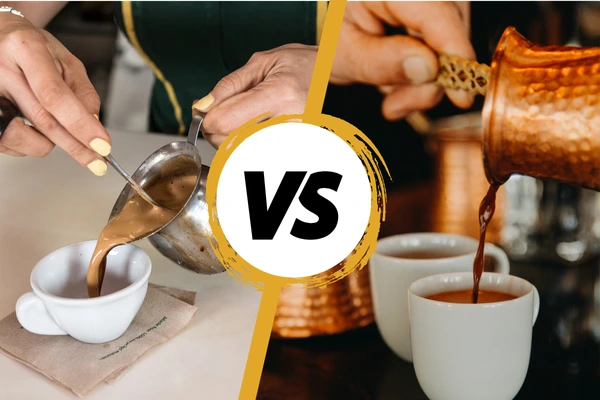Cuban coffee vs Turkish coffee might sound like an odd comparison. One was born in the Caribbean heat, the other in the heart of the Ottoman Empire. Yet both drinks have built cult followings far beyond their homelands. They are more than just a caffeine fix, they’re social rituals, cultural markers, and, for many, the only way coffee should taste. So which one really deserves the crown when these two heavyweights go head to head?
Cuban Coffee vs Turkish Coffee – What Are These Brews?
Let’s see first how each of these brews is prepared:
Cuban Coffee
Cuban coffee, or cafecito, is an espresso-based drink made with dark-roasted beans, usually a blend of Arabica and Robusta. Traditionally, it’s brewed in a stovetop moka pot, a staple in most Cuban kitchens.
Cuban coffee stands out because of the espuma. You whip the first few drops of strong coffee with sugar until they turn into a caramel-colored cream. Once it’s ready, you pour the rest of the moka pot coffee over the espuma.
Cuban coffee has plenty of variations.
- The colada is essentially a larger serving, meant to be shared in small plastic cups among friends.
- The cortadito is Cuban coffee cut with steamed milk.
- The café con leche takes it even further with a milk-heavy balance.
Turkish Coffee
Turkish coffee uses extra-finely ground Arabica beans, almost powder-like, that end up in a cup instead of being filtered out.
You prepare Turkish coffee in a small copper or brass pot called a cezve (ibrik in some regions). From the start, you add water, coffee, and sugar, then slowly bring the mixture to a gentle boil over low heat. As it heats, the coffee foams and rises. You divide the foam into each cup first, then pour the liquid coffee on top.
Turkish coffee keeps things simple, with sweetness levels as the main variation. You can order it:
- Plain (sade),
- Medium (orta),
- Sweet (şekerli).
- In some regions, Turkish coffee is prepared with cardamom for extra aroma.
You may find our comparison between Turkish coffee and Nescafe interesting, and why we prefer tradition over convince.
Cuban Coffee vs Turkish Coffee – Caffeine Comparison
Cuban coffee has more caffeine than Turkish coffee.
Cuban coffee packs around 93 milligrams of caffeine. Brewing it as a concentrated espresso in a moka pot makes the drink far more potent.
Turkish coffee, on the other hand, comes in lower. A standard cup averages about 50 to 65 milligrams of caffeine.
What is the Difference Between Cuban Coffee and Turkish Coffee in Flavors
Cuban coffee is bittersweet because of the sugar-whipped espuma, giving it a caramelized edge. The moka pot brewing emphasizes intensity and a slightly roasted bite. It’s punchy, direct, and designed to wake you up fast.
Turkish coffee is an entirely different experience. Because the grounds are unfiltered and the brew is slow, the flavor is thicker, earthier, and more layered.
More on this topic: What separates Turkish coffee from other brewing methods.
Other Differences Between Cuban Coffee and Turkish Coffee
Here are the other elements that make these two brews different:
Brewing Method
- Cuban coffee uses a moka pot, which works like a mini espresso maker. Water passes through finely ground beans under pressure.
- Turkish coffee is simmered in a cezve with extra-finely ground beans that never get filtered out.
Grind Size
- Cuban coffee is ground fine, but still similar to espresso grind.
- Turkish coffee requires an ultra-fine, powder-like grind, finer than espresso.
Texture
- Cuban coffee is smooth, with crema-like espuma on top.
- Turkish coffee is thick, with coffee grounds settling at the bottom of the cup.
Serving Style
- Cuban coffee is often shared, like a colada with multiple small cups, or served as a cortadito with milk.
- Turkish coffee is usually served individually, often with water and sometimes Turkish delight.
Key Takeaways on Cuban Coffee vs Turkish Coffee
- You should prepare Cuban coffee with a moka pot.
- You brew Turkish coffee in a cezve over slow heat.
- Cuban coffee delivers a stronger caffeine punch, while Turkish coffee focuses more on depth of flavor and texture.
- One highlights energy and sweetness, the other highlights richness and ritual.
FAQ
Is Cuban coffee stronger than Turkish coffee?
Yes. Cuban coffee is stronger than Turkish coffee. On average, Cuban coffee has around 93 mg of caffeine, while Turkish coffee has 50 to 65 milligrams per cup.
Which is more bitter, Cuban coffee or Turkish coffee?
Cuban coffee usually tastes less bitter because sugar is an essential part of its preparation. The whipped espuma adds sweetness and balance to the dark roast. Turkish coffee can be more bitter if ordered plain (sade).
What do people usually eat or serve with Turkish coffee?
Turkish coffee is often paired with a glass of water to cleanse the palate and a small sweet treat like Turkish delight, dried fruit, or a piece of chocolate.

